“અભિવ્યક્તિ – ધ સિટી આર્ટ્સ પ્રોજેક્ટ”, યુએન મહેતા (યુએનએમ) ફાઉન્ડેશનના ડિરેક્ટર સપના મહેતાની મગજની ઉપજ છે. છેલ્લા છ વર્ષોમાં, આ જીવંત ભવ્ય કાર્યક્રમે અમદાવાદ શહેરમાં કલાત્મક ઉત્સાહનો સંચાર કર્યો, ઉભરતા કલાકારોને પ્રોત્સાહન આપ્યું અને શહેરના સાંસ્કૃતિક પરિદૃશ્યને ઉન્નત બનાવ્યું. 15 દિવસના આ સાંસ્કૃતિક ઉત્સવમાં, મફત પ્રવેશ પ્રદાન કરવામાં આવે છે, જેમાં તમામ ઉંમરના લોકો વિવિધ પ્રકારના પ્રદર્શન અને કલા સ્થાપનો રજૂ કરે છે, જેમાં સર્જનાત્મકતા, વિવિધતા, નવીનતા અને સમુદાય ભાવનાની ઉજવણી કરવામાં આવે છે, જે દરરોજ મોટી સંખ્યામાં લોકો આકર્ષાય છે.
પરિચય
પાલડીના સંસ્કાર કેન્દ્ર અને ટાગોર હોલમાં સામાન્ય લાઇનઅપ પ્રદર્શન અને સ્થાપનો સાથે જે શરૂ થયું તે એક સીમાચિહ્નરૂપ ઘટનામાં પરિણમ્યું. આજે, અભિવ્યક્તિ (જેનો અર્થ અભિવ્યક્તિ થાય છે) અનેક મૂલ્યોને આવરી લે છે, લાખોની સંખ્યામાં પ્રેક્ષકોને આકર્ષે છે. પ્રથમ પાંચ આવૃત્તિઓમાં 400 થી વધુ કલાકારોએ ભાગ લીધો હતો, જેમાં 3,500 થી વધુ અરજીઓ મળી હતી, 290 પ્રોજેક્ટ્સનું પ્રીમિયર થયું હતું અને કુલ 3 લાખથી વધુ લોકોને આકર્ષ્યા હતા. શરૂઆતમાં, ધ્યેય પ્રતિભાને પ્રોત્સાહન આપવા, કલાને સુલભ બનાવવા અને અમદાવાદના કલા પ્રત્યેના લાંબા સમયથી ચાલતા જુસ્સાને પુનર્જીવિત કરવાનો સીધો હતો.

૨૧ નવેમ્બર, ૨૦૨૪ ના રોજ શરૂ થયેલી “અભિવ્યક્તિ – ધ સિટી આર્ટ્સ પ્રોજેક્ટ્સ” ની છઠ્ઠી આવૃત્તિમાં અત્યાર સુધીમાં ૧.૮૯ લાખ મુલાકાતીઓ આવ્યા છે, જે ૮ ડિસેમ્બર, ૨૦૨૪ ના રોજ છેલ્લા દિવસ સુધીમાં ૩ લાખ સુધી પહોંચવાની ધારણા છે. આ આવૃત્તિમાં ભાગ લઈ રહેલા ૯૬ કલાકારોમાંથી ૫૦% ગુજરાત બહારના છે.
પ્રદર્શન અને કલા ચિત્રો
” હાઉ ધીસ, હાઉ ધેટ!! ” નામનું રમૂજી, કટાક્ષપૂર્ણ સીએલ પ્રદર્શન થૈકર થિયેટર દ્વારા રજૂ કરવામાં આવ્યું છે , જેમાં પ્રિતેશ આચાર્ય, જીગર, અજાઝ શેખ, હેત પંચાલ અને અમિત ઠક્કરનો સમાવેશ થાય છે. આ રોલરકોસ્ટર ટ્રીપમાં જંગલી અનુભવો અને અનિયંત્રિત આનંદનું વચન આપવામાં આવ્યું છે.
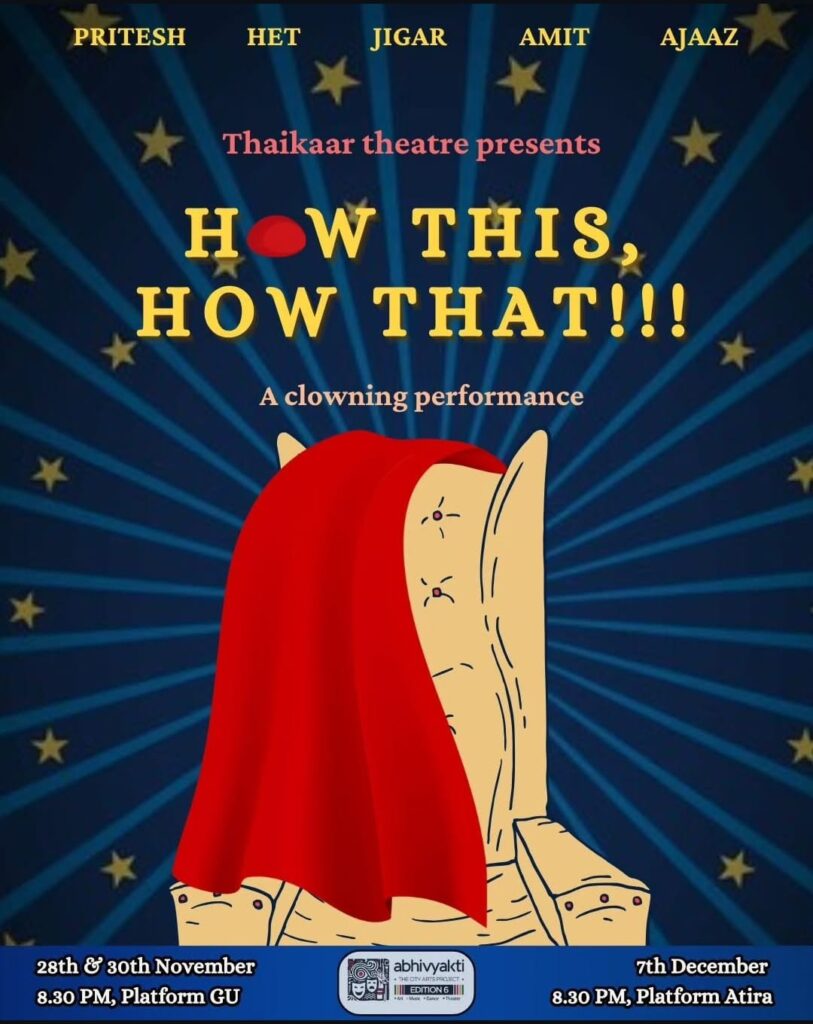
સંગીત અને લોકકથાઓ પર આધારિત સ્ત્રી વાર્તાઓના સંકલન, વહી કહાની ફિર માં , અનન્યા વૈદ્યએ દિગ્દર્શક તરીકેની શરૂઆત કરી. વૈદ્યના નાટક, જેણે સામાન્ય સ્ત્રીઓની દફનાવવામાં આવેલી વાર્તાઓને જીવંત કરી, તેમાં નારીવાદ અને વાર્તા કહેવાની કળાને સમકાલીન વળાંક સાથે તપાસવામાં આવી.
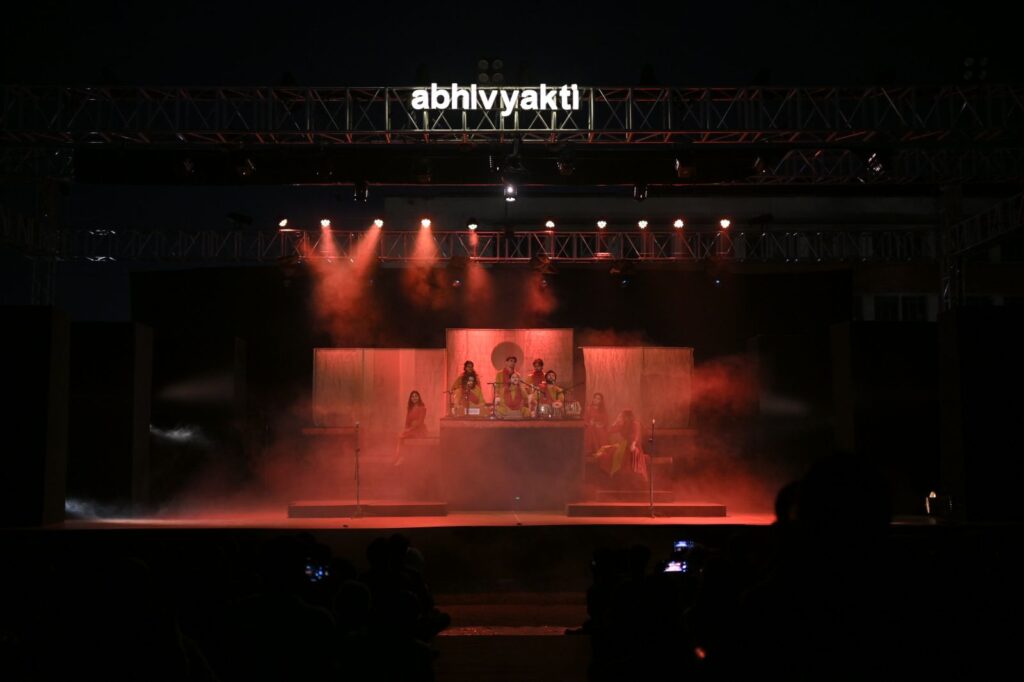
રાજુ બારોટ દ્વારા રચિત રંગભૂમિ ના સદાબહાર ગીતોએ પરંપરાગત અને નવા સંગીતના મિશ્રણ દ્વારા નાટ્ય લોક પરંપરાઓનું જતન કર્યું અને તેને આધુનિક પ્રેક્ષકો માટે સુલભ બનાવ્યું. પશ્ચિમી અને પરંપરાગત બંને પ્રકારના વાદ્યોના તેમના ઉપયોગથી પ્રેક્ષકો મંત્રમુગ્ધ થઈ ગયા.

ધ ઓપન ચેન્નાઈનું પ્રતિનિધિત્વ કરતા કાર્તિકે અભિવ્યક્તિમાં શેડો પપેટ પર્ફોર્મર તરીકે પોતાની શરૂઆત કરી હતી. કાર્તિકે કહ્યું, “અમે એક સાથી કલાકાર પાસેથી અભિવ્યક્તિ વિશે શીખ્યા, અને આ પ્લેટફોર્મે અમને ખૂબ જ એક્સપોઝર આપ્યું. ગુજરાતમાં લોકો શેડો પપેટી વિશે જાણતા ન હતા, અને આપણી મૂળ કલા સ્વરૂપની ખૂબ પ્રશંસા થતી જોઈને હૃદયસ્પર્શી આનંદ થયો.” તેમણે ‘ધ વુલ્ફ મેન’ રજૂ કર્યું, જેમાં પર્યાવરણીય ટકાઉ સંતુલનની સભાન જાગૃતિ સાથે પ્રકૃતિના અવલોકન સાથે જોડાયેલી વાર્તા વર્ણવી. શેડો પપેટ્સનો ઉપયોગ કરીને, ‘ ધ વુલ્ફ મેન’ એક મનમોહક પડછાયાની દુનિયા બનાવે છે જ્યાં પ્રેક્ષકો તેમાં પોતાને લીન કરી શકે છે.

નીલકાંતન પ્રથમ કૃષ્ણને કર્ણાટક સંગીતનું મનમોહક પ્રદર્શન કર્યું. તેમના ” સ્વયમ્: ધ વોઇસ વિથિન ” માં, તેમણે વિષ્ણુના દસ અવતારોનું પરીક્ષણ કરવા માટે આધુનિક પશ્ચિમી સંગીત અને પરંપરાગત ભારતીય સંગીતના વિશિષ્ટ મિશ્રણનો ઉપયોગ કર્યો. સતયુગના પ્રાચીન ધ્વનિઓથી લઈને કૃષ્ણના સમકાલીન યુગ સુધી, દરેક ગીતમાં ચોક્કસ અવતારની ભાવનાને સમાવિષ્ટ કરવામાં આવી હતી. આ રચનાઓએ પશ્ચિમી વાદ્યો, લયબદ્ધ શબ્દો અને શાસ્ત્રીય રાગો જેવા વિવિધ સંગીત ઘટકોને જોડીને એક જટિલ અને શોધક ધ્વનિ દૃશ્ય બનાવ્યું. પ્રખ્યાત લેખકો ગીતોમાં વિષ્ણુ અવતાર સાથે જોડાયેલ કરુણા, શાણપણ, નમ્રતા અને શક્તિના ખ્યાલોનું અન્વેષણ કરે છે.

દીપક અને ભૂમિતિ પ્રજાપતિએ સમકાલીન નૃત્ય અને નિયો-ક્લાસિકલ બેલે રજૂ કર્યા. બેલે નૃત્યાંગના દીપક અને કથક નૃત્યાંગના ભૂમિતિએ ” પંચતત્વ-સંવેદનાઓની સિમ્ફની ” ના તેમના પ્રદર્શનમાં સંવેદનાત્મક ટુકડી અને કાયાકલ્પનો અનુભવ કર્યો. એક માર્ગદર્શક અને પ્રકૃતિના પાંચ તત્વોની મદદથી, આ ગતિશીલ પ્રદર્શનનો નાયક બાહ્ય વિશ્વથી દૂર થઈ ગયો અને સ્વ-શોધની સફર પર નીકળ્યો. આ મનમોહક કાર્ય નૃત્ય અને પ્રતીકવાદને જોડીને સંવેદનાત્મક પુનર્જીવન અને બાહ્ય વિશ્વ સાથે પુનઃ જોડાણનું કરુણ ચિત્રણ પ્રદાન કરે છે.

કથક નૃત્યાંગના કદમ પરીખે , મધ્યયુગીન કવિ પ્રેમાનંદના “આખ્યાન” પરથી પ્રેરિત એક નાટક રજૂ કર્યું. તેમણે તેમના ” કથક આખ્યાન-અભિમન્યુ પર્વ ” માં વિસ્તૃત ગતિ અને ભાવનાત્મક વર્ણનનો ઉપયોગ કરીને મહાકાવ્યની ભાવનાત્મક ઊંડાણનો અભ્યાસ કર્યો. આ વાર્તામાં મહાભારતના પાત્ર અભિમન્યુની અકથિત વાર્તાઓ પર પ્રકાશ પાડવામાં આવ્યો હતો. માત્ર 16 વર્ષના ટૂંકા આયુષ્ય છતાં, અભિમન્યુ ખ્યાતિ પ્રાપ્ત કરી અને આજે પણ તેને યાદ કરવામાં આવે છે.

” ધ કાર્નિવલ ઓફ ડેથ ” એ ઉજ્જૈનના ઇવાન ખાને રજૂ કરેલા ડાર્ક કોમેડી અને એબ્સર્ડ નાટકનું શીર્ષક હતું . તેમાં અસ્તિત્વવાદ અને તેની આસપાસની સમસ્યા વિશે વ્યંગાત્મક વાર્તા કહેવામાં આવી હતી. તે COVID-19 પછી લોકોએ અનુભવેલી હાસ્યાસ્પદતા, તેમજ સંઘર્ષો, વનનાબૂદી અને ગ્લોબલ વોર્મિંગની વધતી જતી આવૃત્તિની ચર્ચા કરે છે.

” ગોલ ચશ્મા ” એ લોક-મ્યુઝન પ્રદર્શન છે જે આરીફ મીરે આયોજિત કર્યું છે. “ગોલ ચશ્મા”, જે મહાત્મા ગાંધીના ઉપદેશોથી પ્રેરણા લઈને આવ્યું હતું, તેમાં આધુનિક વિશ્વ માટે ગાંધીજીના ઉપદેશો કેટલા લાગુ પડે છે તેની તપાસ કરવામાં આવી હતી. સંગીત દ્વારા, તે એક વિશિષ્ટ દ્રષ્ટિકોણ રજૂ કરે છે જે ભાર મૂકે છે કે બધા લોકો કેટલા એકબીજા સાથે જોડાયેલા છે. ગાંધીજીની નજર દ્વારા, સંગીતમય વિશ્વને રજૂ કરે છે, અસ્તિત્વના તમામ પાસાઓમાં રહેલી સંવાદિતા અને સુંદરતા દર્શાવે છે. તેણે અમને તેમના પાઠ સ્વીકારવા અને તેમને વ્યવહારમાં મૂકવા પ્રેરણા આપી, જેના પરિણામે વધુ સંતોષકારક અને નોંધપાત્ર અસ્તિત્વ પ્રાપ્ત થયું.
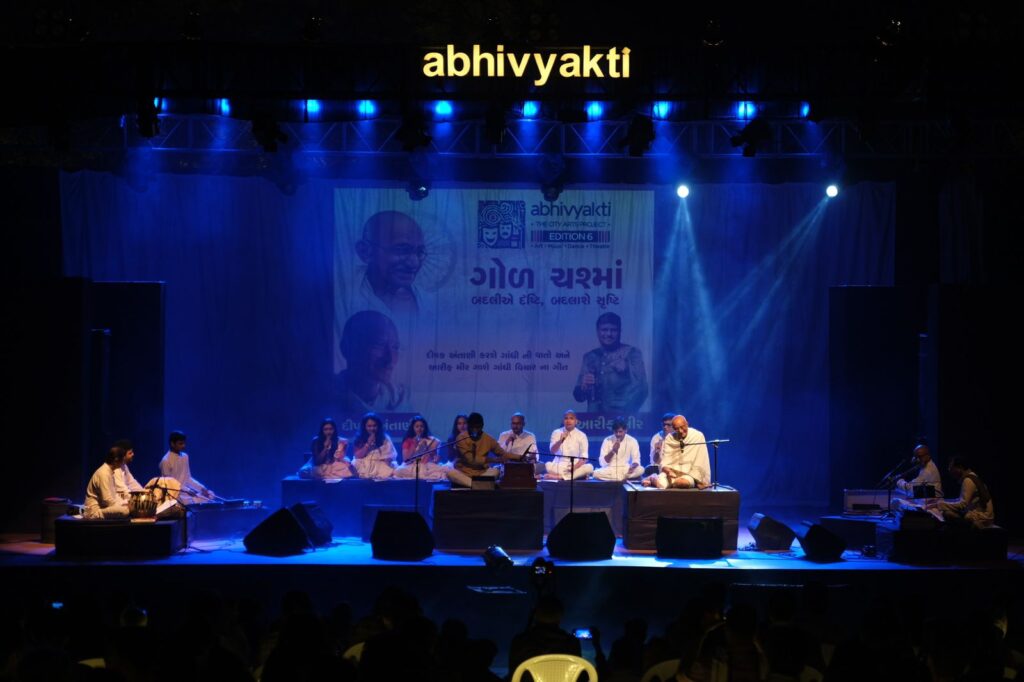
ઇતિહાસના સૌથી આતિથ્યશીલ બળવાખોરોમાંના એક, ” જોગીદાસ ખુમાન-એક સંત બહારવટિયો ” ના વર્ણન પર આધારિત એક પીરિયડ ડ્રામા, જેમની ભૂતપૂર્વ ભાવનગર રાજ્યના રાજા સાથેની દુશ્મનાવટને હજુ પણ શ્રદ્ધા અને દયાથી યાદ કરવામાં આવે છે, તેને દેવલ વોરા અને આસિફ અજમેરી દ્વારા ફરીથી રજૂ કરવામાં આવ્યું હતું . તેમના નિર્માણમાં કાઠિયાવાડ નાયકની વાસ્તવિક વાર્તા કહેવામાં આવી હતી જેણે 25 વર્ષ પોતાના અધિકારો માટે લડ્યા અને સંત બન્યા. વાર્તા કહેવા માટે લોકકથાનો ઉપયોગ કરવામાં આવ્યો હતો, અને કલાકારોએ જીવંત ગીતો, નૃત્ય અને સંગીત રજૂ કર્યું હતું.
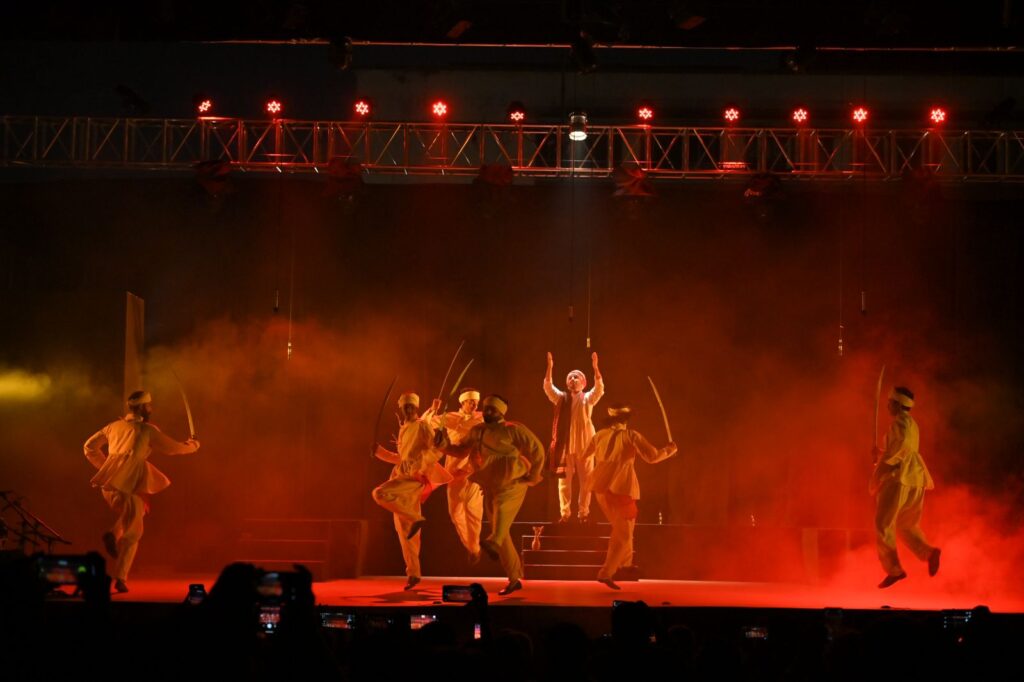
કિરણ પંચાલ અને તેમના સાથીઓએ ” મરઝી મુશાયરા ” નો વિચાર રજૂ કર્યો , જે એક હાસ્ય અને સંગીતમય શો છે જે પ્રેક્ષકો-સંચાલિત પડકારો, રમૂજ અને પરંપરાગત કવિતા પઠનનું સંયોજન કરે છે. આ કારણે, આ કાર્યક્રમ આનંદપ્રદ અને હળવો હતો. આ ફોર્મેટમાં કાવ્યાત્મક અભિવ્યક્તિ ઉપરાંત વિનોદ, કટાક્ષ અને રમૂજ પર ભાર મૂકવામાં આવ્યો હતો. “મરઝી મુશાયરા” માં સામાજિક મુદ્દાઓ, રોજિંદા જીવન અને મનોરંજક અતિશયોક્તિઓના સંદર્ભમાં રમૂજની ચર્ચા કરવામાં આવી હતી.

રજની ભોંસલે દ્વારા લખાયેલ એક દ્રશ્ય કલાકૃતિ, ” પ્રત્યક્ષમાં ભૂતકાળની ઝાંખી ” , આપણને એક ક્ષણિક સફર પર લઈ જઈને આપણા ઇતિહાસ, વર્તમાન અને ભવિષ્ય પર ચિંતન કરવા માટે આમંત્રણ આપે છે. તેમનું કાર્ય આપણા કુદરતી વારસાના સંરક્ષણને માનવ પ્રગતિથી અલગ કરતી સૂક્ષ્મ રેખાની શોધ કરે છે. ભોંસલેના મતે, આપણે વારંવાર આપણા સ્થાનો પર કબજો કરતા પક્ષીઓના સમાન મહત્વપૂર્ણ જીવનની અવગણના કરીએ છીએ, ભલે આપણે પ્રાચીન રચનાઓનું સંરક્ષણ કરવાનું કામ કરીએ છીએ. તેણી આપણને પડકાર આપે છે કે આપણી ક્રિયાઓ પર્યાવરણને કેવી રીતે અસર કરે છે અને પ્રકૃતિ સાથે સુમેળમાં રહેવાની આપણી ફરજને સ્વીકારીએ.

ચેતન સોલંકી દ્વારા હાથથી બનાવેલા ફ્લોર ટાઇલ્સ અને પક્ષીઓની છબીઓનો ઉપયોગ કરીને નુકસાનનું એક ભાવનાત્મક પરીક્ષણ, ” ટાઇમ ફ્લાય્સ એન્ડ મેમોરિઝ ફેડ ” પ્રદર્શિત કરવામાં આવ્યું હતું . કલાકાર ગુજરાતના નળ સરોવર પક્ષી અભયારણ્યની તેમની યાદોથી પ્રેરિત ઉત્તેજક છબીઓ બનાવવા માટે ફારસી અને ભારતીય લઘુચિત્ર પરંપરાઓનો ઉપયોગ કરે છે. સોલંકી દર્શકોને પરંપરાગત તકનીકોને સમકાલીન સામગ્રી સાથે જોડીને જીવનની અસ્થાયીતા અને આપણી નુકસાનની લાગણીઓ વચ્ચેના જોડાણો પર ચિંતન કરવા કહે છે. પ્રેક્ષકોને આત્મનિરીક્ષણની વ્યક્તિગત યાત્રા પર દિશામાન કરીને, સોલંકી તેમના કાર્યનો ઉપયોગ સહાનુભૂતિ અને આંતરદૃષ્ટિ મેળવવા માટે કરે છે.
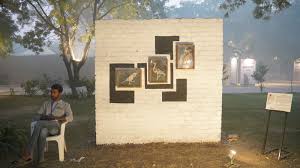
કલાકાર તાન્યા શર્માની ઉત્તેજક શિલ્પકૃતિ દ્વારા, કલાકાર તાન્યા શર્માની કલા સ્થાપના ” છુપાડો અને શોધો ” દર્શકોને સ્વ-શોધની એક મનોહર સફર પર લઈ જાય છે. તેમનું કાર્ય આપણી પૂર્વધારણાઓને પડકારે છે અને આપણને પરિચિતતાથી આગળ જોવાનું કહે છે. તેમનો ઉદ્દેશ્ય છુપાયેલી વાસ્તવિકતાઓને ઉજાગર કરવાનો અને માનવ માનસના જટિલ ફેબ્રિકને ઉજાગર કરીને દર્શકોને તેમના પોતાના પૂર્વગ્રહોનો સામનો કરવા સક્ષમ બનાવવાનો છે. તાન્યા માને છે કે તેમના કાર્યમાં પ્રેક્ષકોને અનિશ્ચિતતાને સ્વીકારવા અને વ્યક્તિગત વિકાસ અને પરિવર્તન માટે ઉત્પ્રેરક તરીકે કાર્ય કરીને સ્વ-શોધના માર્ગ પર આગળ વધવાની શક્તિ છે.

મહેતા પરિવારના ટોરેન્ટ ગ્રુપના અભિવ્યક્તિ – ધ સિટી આર્ટ્સ પ્રોજેક્ટના UNM ફાઉન્ડેશનનો ધ્યેય કલાને સમાજનો એક મહત્વપૂર્ણ ઘટક બનાવવાનો છે, જેના દ્વારા પ્રેક્ષકોને તેમના સ્થાન, વ્યક્તિગત અથવા સામાજિક અવરોધો અથવા સામાજિક આર્થિક સ્થિતિને ધ્યાનમાં લીધા વિના મફત પ્રવેશ આપવામાં આવે છે. અભિવ્યક્તિનું છઠ્ઠું પુનરાવર્તન 21 નવેમ્બરથી 8 ડિસેમ્બર, 2024 દરમિયાન યોજાશે. આ વર્ષે, 49 કલાકારો દ્વારા 50 પ્રદર્શન આપવામાં આવશે. વધુ 47 કલાકારો 46 દ્રશ્ય કલા ડિઝાઇન અને સેટ કરશે.
Read Also: Andhra Pradesh Government Dissolves Waqf Board Constituted By YSR Congress Regime